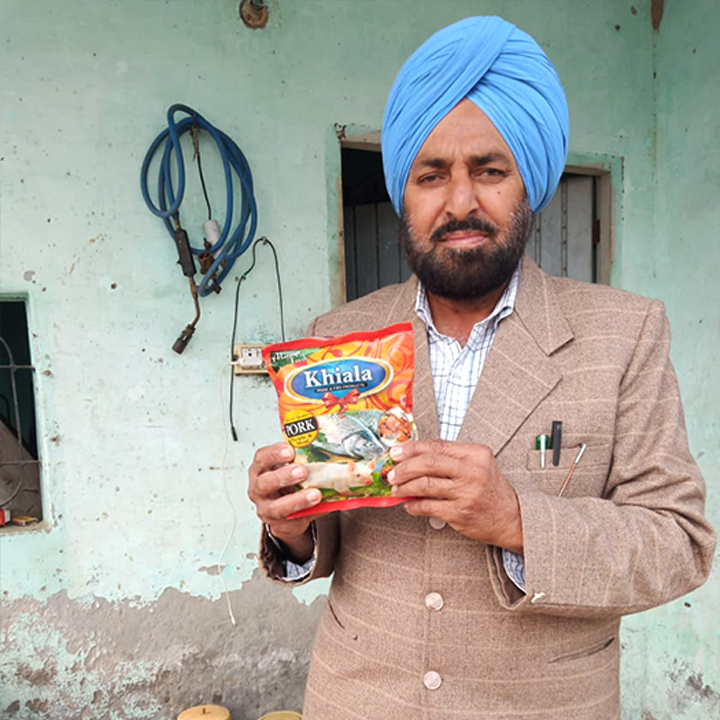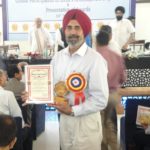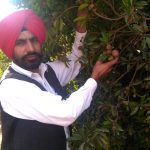
Harbhajan Singh
A farmer who succeeded in running 5 different professions on a single platform and therefore is recognized as Shaktiman of Farmers- Harbhajan Singh
Diversification is a vital process to achieve successful outcomes in this rapidly changing, fast-paced world. It is hard to adopt but very necessary these days. Everyone in the universe is born to do something unique and distinctive. However, many people are afraid of the change and hence, they hold back their thoughts on diversification. Only some people can realise their uniqueness and reach the stars to change the world. This story is about one such person.
Where most farmers go with the traditional way of cultivating Wheat and Rice, Harbhajan Singh, a farmer from Malakpur village, Mansa, contributes his efforts towards the multiformity in Agriculture. He is successfully running an integrated farm on 11 acres of his land in which he rears fish, pigs, hens, goats and quails. Moreover, he has also taken 55 acres of Panchayati land on rent in which he rears fish.
After completing his graduation in 1981, Harbhajan Singh started a mechanical workshop and along with that, he was helping his family with agricultural work. At that time, his friend suggested him to start rearing fishes. So then, he began researching the fish rearing process and soon took a village pond on rent to nurture fishes.
I made a significant profit by rearing fishes and hence, decided to work on my private land– Harbhajan Singh
He was benefited from this work, therefore, in 1995 he decided to get training from Punjab State Fisheries Development Board, Mansa and started working more effectively on his own land. Harbhajan Singh prepared a pond on 2.5 acres on his own land and later bought additional 2.5 acres of land adjoining his pond. His fish production at that time was 6 tonnes per hectare. Later, he decided to get training from the Central Institute of Freshwater Aquaculture, Bhubaneswar, Odisha and bought 6 breeds of fish (Rohu, Katla, Murakh, Grass Carp, Common Carp and Civil Carp) and 3 aerators to increase the fish production. The government provided these aerators with a half subsidy. The productivity of the fish rose to 8 tonnes per hectare after the use of aerators.
I had to buy fish seeds from the government hatchery, which was a costly process; therefore, I prepared a hatchery of my own– Harbhajan Singh
Along with fish rearing, he prepared a hatchery to produce Fish Seeds as it was costly to buy seeds from other hatcheries. Generally, the hatcheries are government-made, but Harbhajan Singh was so hardworking and dedicated that he prepared his own hatchery with a large initial investment. The hatchery provides artificial rain to the fishes to help them breed. He produced about 20 Lakh finger-sized fish seeds in the hatchery and sold them for 50 paise to 1 Rs per seed.
Over time, he initiated Pig farming in 2009 with 50 pigs of large white Yorkshire breed and decided to sell them as live weight. This type of marketing was not effective enough, so he decided to start processing pig meat. He gained training in Meat products from CIPHET, PAU, GADVASU and processed pig meat into pickle. Marketing the meat pickle was a great success; his income almost got doubled.
At present, Harbhajan has around 150 pigs and he uses pig waste to feed the fishes. This saved him 50-60% of the cost, and the fishes’ production rose about 20%. And, now he produces 10 tonnes of fish per hectare.
He started a Fish Pork Processing Self Help Group of 11 members. This gave employment to many people and added to their incomes.
Harbhajan Singh was also awarded by the Chief Minister of Punjab for his success in integrated farming.
Things did not stop here! He had a long way to go.
As there is an increase in water scarcity, Harbhajan found a way to save nature by recycling the water. He reuses water by first using it for bathing the pigs; then, the same water is released to flow into the fish pond and the wastewater from the fish pond is used to irrigate the crops in the field. This water is organic and provides fertilisers to the crops; hence the only half amount of fertilisers is required to be added artificially. The Punjab CM, Parkash Singh Badal was very impressed with Harbhajan Singh’s efforts and visited his farm.
I got training from KVK, Mansa, to initiate Goat Farming– Harbhajan Singh
Furthermore, he decided to include goats in his farming; hence, he got training from KVK, Mansa and started working with 30 goats, including Beetal and Sirohi, in the beginning and at present, Harbhajan has 150 goats. Later in 2017, he started visiting Kisan Mela at PAU, from where he got the inspiration to rear Quails and Hens. Hence, he bought 2000 Quails and 150 Kadaknath Hens from Chandigarh. These hens are allowed to roam openly and find their feed on their own from the leftovers of other animals’ feed. Currently, he rears 3000 Quails at his farm.
All the feed for the animals is prepared at the field by him with the help of machines. Today, Harbhajan runs his farm successfully with his two sons, who help him in the farm works. He manages all the farming with the assistance of only one helper. He sells fish seeds for 2 Rs per seed. Besides, he sells the goats in Malerkotla on Bakar Eid’s occasion and prepares Goat pickles from the meat. The eggs of Kadaknath hen are sold for Rs 15-20 and the chicken meat is sold for Rs 700- 800. Harbhajan then got training from ICAR-CIFE, Kolkata, for making fish pickles, fish soup etc and marketed the product in the home market. He sells his product under the name “Khiala Pork and Fish Products”.
Marketing of the products is done at my farm itself– Harbhajan Singh
All the marketing process is done in his field itself; he does not need to go anywhere to sell his products. He motivated many young farmers and they visit him for taking his advice regarding integrated farming. He became an inspiration for others and encouraged many other people to run an integrated system of farming.
Future Plans
Harbhajan Singh wants to increase his income and take his farming to a higher level. He wants to be more successful in integrated farming and teach people about the benefits of organic and diversified farming.
Message
Harbhajan Singh advises young farmers to pursue organic farming. If any farmer wants to start integrated farming, he should begin from a base level and gradually add other aspects to their business.









